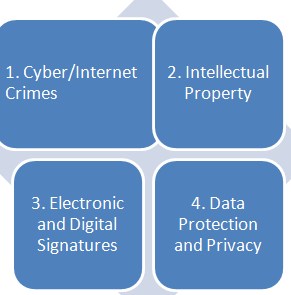Cyber Law in India
Information technology deals with information system, data storage, access retrieval, analysis, decision making. Information Technology refers to” the creation, gathering, dissemination of information and also the processes that enable all this to be done”. Information Technology is affecting us as an individual and as a society. It stands firmly on hardware and software of a computer and telecommunication infrastructure. But this is only one aspect of the Information Technology, today the other aspects are the challenges for the whole world like Cyber Crimes and Cyber Terrorism. When Internet was first developed the founding fathers hardly had any inkling that internet could be misused for criminal activities. With the emergence of technology the misuse of the technology has also expanded to its optimum level, the examples of some misuse include:
- Cyber Stalking
- Cyber Harassment
- Cyber Fraud
- Cyber Defamation
- Spam
- Hacking
- Trafficking
- Posting and dissemination of obscene material including pornography
- Indecent exposure and child pornography etc.
Cyber Law is a law governing cyber space. Cyber space is a very wide term which includes – computers, networks, hardware, software, and data storage devices – such as Hard disk, USB, emails and electronic devices such as cell phones, ATM Machines etc. Cyber law is an attempt to apply laws designed for the physical world, to human activity on the internet. In India, the Information Technology 2000 as amended by Information Technology (Amendment) Act 2008 is known as Cyber Law. Violation of these rules could lead to government action such as imprisonment, fine etc.
Cyber Law includes laws relating to –

-
Cyber/Internet Crimes –
Cyber crime is a generic term that refers to all criminal activities done using the medium of computers, cyber space and World Wide Web. The economic growth in electronic commerce (e- commerce) and online share trading has led to phenomenal spread of Cyber Crimes.
Cyber Crimes includes –
- Cyber Crimes against persons
- Cyber Crimes against government
- Cyber Crimes against property
-
Intellectual Property –
Intellectual Property Rights are legally recognized exclusive rights to creating of human rights. Under Intellectual Property law owners are granted certain exclusive rights over some intangible assets such as musical, literary etc. Common types of Intellectual Property Rights includes – trademark, copyright etc.
-
Electronic and Digital Signatures –
Electronic Signatures are used to authenticate electronic records. Digital Signatures are one types of electronic signature. Digital signatures are used in e- commerce and in regulatory filings as digital signatures are more secure than a simple generic electronic signature.
-
Data Protection and Privacy –
It aims to achieve a fair balance between the privacy rights of an individual and the interests of the data collector such as banks, hospitals etc. These laws seek to address the challenges to privacy caused by collecting, storing, transmitting using new technologies.
Cyber Laws in India
The Information Technology Act, 2000 came into force on October 17, 2000. The General Assembly of the United Nations adopted the Model Law on Electronic Commerce adopted by the United National Commission on International Trade Law. The Act deals with the law relating to Digital Contracts, Digital Property and Digital Rights. Any violations of these laws may constitute a crime. The Act prescribes very high punishments for such crimes. The Information Technology (Amendment) Act, 2008 has further enhanced the punishments. Life Imprisonment and a fine up to rupees ten lakhs may be given to certain classes of cyber crimes. Compensation up to rupees five crores can be given to affected person if damage is done to the computer, computer system or computer network by the introduction of virus, denial of services etc.
